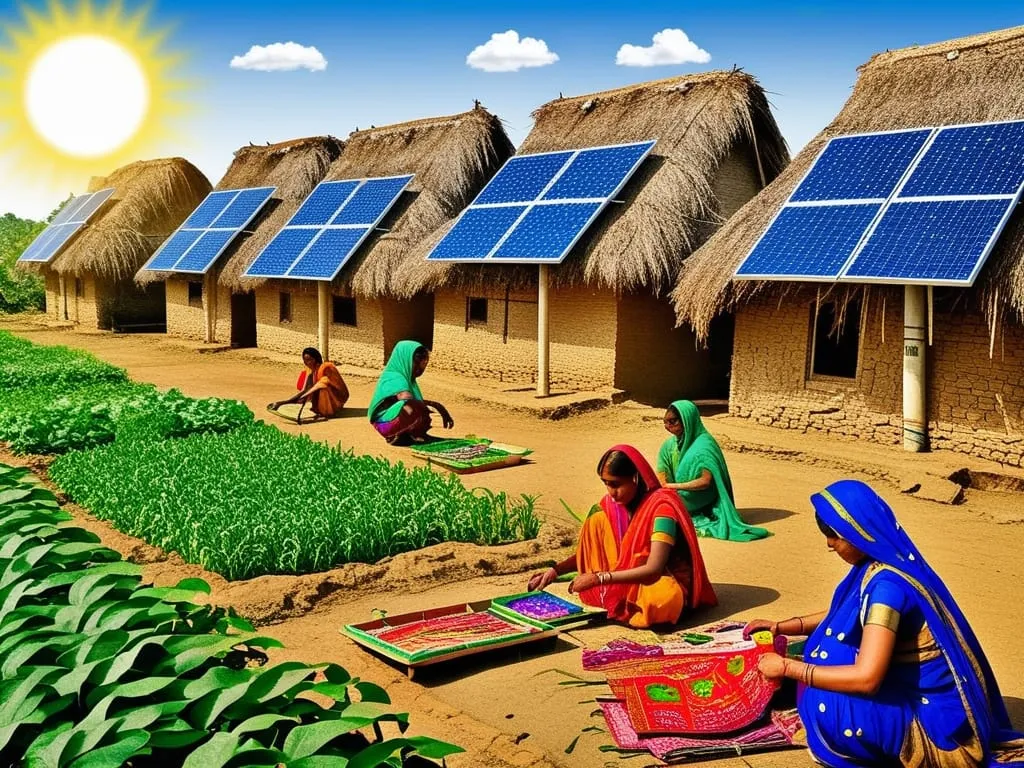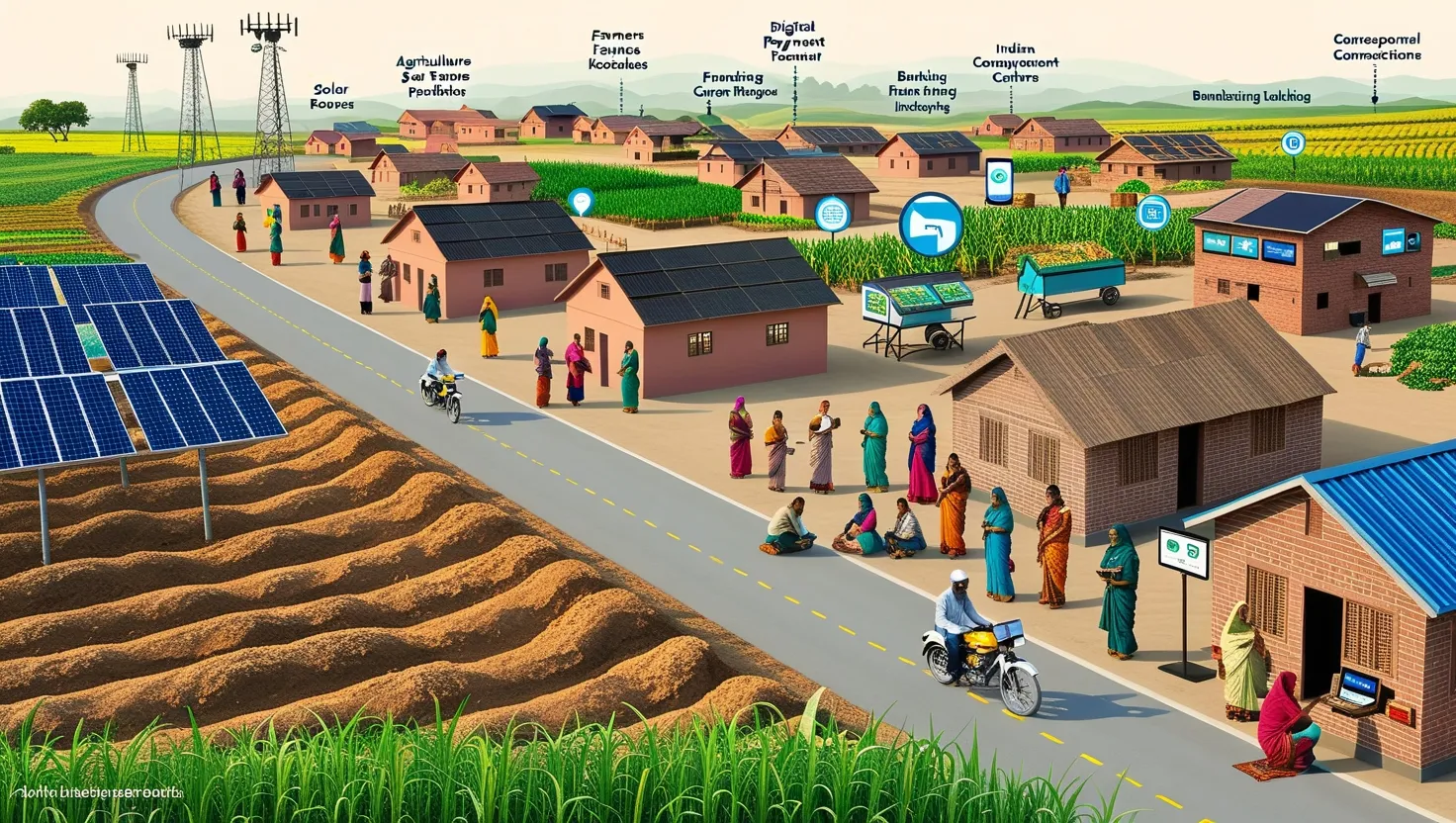In the heart of rural India, a quiet revolution is underway, one that blends traditional practices with modern innovation and financial savvy. This is the world of impact investing, where the pursuit of profit is intricately linked with the pursuit of purpose.
Imagine a village where farmers, once reliant on outdated methods, now harness the power of solar energy to irrigate their fields and power their homes. This transformation is not the result of charitable handouts, but rather the outcome of smart investments designed to uplift entire communities. Impact investing in rural India is a story of how financial returns can be generated while simultaneously addressing some of the most pressing social and environmental challenges.
The Landscape of Rural India
Rural India, with its vast agricultural lands and diverse communities, presents a unique opportunity for impact investors. Here, the need for sustainable solutions is palpable. Farmers struggle with erratic weather patterns, limited access to credit, and outdated farming techniques. However, with the advent of impact investing, these challenges are being met head-on.
For instance, investments in renewable energy projects, such as solar farms, are not only reducing carbon emissions but also providing reliable and affordable energy to rural households. This shift is crucial in a country where energy access is a significant barrier to development. Solar-powered irrigation systems, for example, have enabled farmers to cultivate their land more efficiently, leading to increased crop yields and better economic outcomes.
Microfinance: Empowering Entrepreneurs
Microfinance is another critical area where impact investing is making a significant difference. Micro-lending institutions provide financial services to low-income entrepreneurs, enabling them to start or expand their businesses. These loans are often small, but they can have a profound impact on the lives of the recipients.
In a small village in Rajasthan, a woman named Leela used a microloan to start a small textile business. With the initial capital, she was able to purchase a sewing machine and raw materials, which allowed her to create and sell handmade garments. Today, Leela's business supports not only her family but also employs several other women from her community, creating a ripple effect of economic empowerment.
Affordable Housing and Healthcare
Impact investing is also addressing the critical need for affordable housing in rural areas. Real estate projects focused on creating affordable housing options are not only providing shelter but also contributing to the overall well-being of the community. These projects often include amenities such as clean water and sanitation facilities, which are essential for public health.
In the realm of healthcare, impact investments are backing companies that work on medical breakthroughs and affordable healthcare solutions. For example, telemedicine services are being expanded to rural areas, allowing villagers to access medical consultations remotely. This has been particularly beneficial during the pandemic, where physical access to healthcare facilities was severely limited.
Government Support and Technological Advancements
The success of impact investing in rural India is also attributed to supportive government policies and technological advancements. Initiatives like the Atal Innovation Mission, launched in 2016, provide technical and infrastructure support to startups focused on positive social and environmental outcomes. This mission has nurtured impact-driven startups specializing in areas such as energy, health, education, and agriculture.
Technological advancements, particularly in the areas of digital penetration and 5G technology, have enabled tech-driven businesses to scale their impact. The "next half billion" narrative in India, which focuses on the vast and swiftly expanding bottom half of the Indian economy, highlights the potential for impact-driven enterprises to create low-cost offerings for previously overlooked customer groups.
Collaboration and Sustainable Business Models
Collaboration is a key principle of impact investing in rural India. Investors often partner with local communities, NGOs, and government agencies to identify pressing social or environmental issues and implement targeted investments. For example, partnerships with local communities can help in identifying the most critical needs, such as access to clean water or sustainable energy.
Sustainable and scalable business models are also crucial for the success of impact investing. Agriculture, for instance, is a promising sector where impact investors can support sustainable farming practices and promote market linkages. This not only addresses food security challenges but also creates new jobs and income opportunities for small farmers.
The Future of Impact Investing
As we look to the future, it's clear that impact investing in rural India holds immense promise. The internal rate of return on equity impact investments in India has been impressive, with an overall rate of around 30% over the past decade. These investments have impacted more than 500 million lives across the country, demonstrating the potential for financial growth and social change.
The maturing ecosystem in India, supported by organizations like the Impact Investors Council (IIC), is further facilitating growth-stage impact investing. Government-backed funds like the Samridhi Fund, launched by the Small Industries Development Bank of India (SIDBI), provide capital to financially viable social enterprises, instilling confidence among early-stage impact investors.
Personal Stories of Impact
To truly understand the impact of these investments, one needs to look at the personal stories of the people involved. Take the example of Rohan, a young farmer from a village in Maharashtra. Rohan's family had been farming for generations, but their yields were always inconsistent due to lack of access to reliable irrigation. After an impact investment in a solar-powered irrigation system, Rohan's farm saw a significant increase in crop yields. This not only improved his family's economic situation but also allowed him to send his children to school, breaking a cycle of poverty that had lasted for years.
Redefining Success in Investing
Impact investing in rural India is redefining what success means in the investment landscape. It's no longer just about generating financial returns; it's about creating a positive impact on society and the environment. For investors, this means aligning their financial objectives with their values, contributing to addressing some of the world's most pressing challenges while potentially achieving competitive returns.
As the world moves closer to the 2030 milestone for the Sustainable Development Goals (SDGs), the need for innovative financing solutions is more pressing than ever. Impact investing in rural India is a beacon of hope, showing that with the right approach, profit and purpose can not only coexist but thrive together.
In this bustling village, where traditional farming meets cutting-edge technology, we see a future where financial models prioritize long-term growth and societal benefits. It's a future where the lives of villagers are improved not through charity, but through smart investments aimed at uplifting communities. This is the world of impact investing in rural India, a world where profit and purpose are intertwined, creating a brighter future for all.






